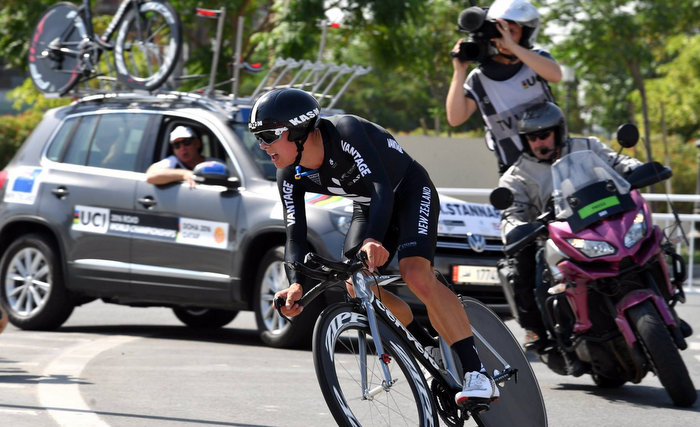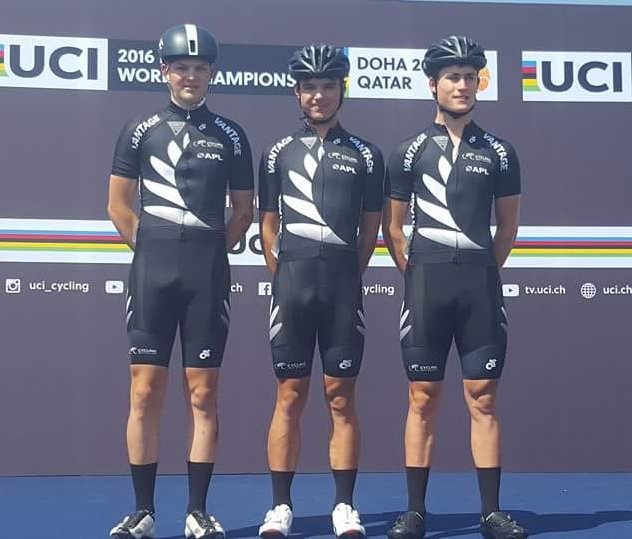Doha, Qatar, 9th -16th October, 2016.
The biggest, in terms of participating nations anyhow, annual event on the cycling calendar has just been run and won in the Gulf nation of Qatar.
The very contrasting conditions, and a very contrasting environment to last years Championships in Richmond, Virginia, provided the opportunity for a different type of rider to wear the Rainbow Jersey for 2017.

The event was held a fortnight later than usual to allow the weather in Doha to cool a little from the 40 degree plus conditions which can occur in September. Even so, the predicted conditions of high thirties and mid-range humidity was on the minds of those preparing, as the heat can potentially play a bigger role that race fitness.
The week started out with the Teams Time Trial (TTT), where the cream of the road cycling professional peleton competed for 183,000 Euros and bragging rights as to who was the fasted team in the world. The extremely hot conditions saw a number of riders in distress, but some very fast times on a technical 40 km course.
The womens TTT was won by Boels Dolmans , a team that included high profile riders Elizabeth Deignan (nee Armisted), Evelyn Stevens, and Ellen van Dijk, in a time of 48.41. Taking the minor placings were Canyon SRAM and Cervelo Bigla. The team of NZ rider Georgia Williams, Be Pink, were 50 seconds from the podium in 4th position.
In the mens event, Etixx Quickstep lead by former individual time trial (ITT) champion Tony Martin, beat last years winners BMC Racing, by only 12 seconds and averaged 56.426km/h for their win. The Australian registered Orica Bike Exchange team were third, some 37 seconds in arrears. No NZ men were involved in the TTT.
Two days later the ITT events started, with the U23 men and U19 girls the following day. Hayden McCormick (One Pro Cycling) and Sam Dobbs (BMC Development) were the kiwi contingent in the U23 mens event, with Madeleine Park and Mikayla Harvey our representatives in the girls event. A mechanical in the first 3 km put paid to McCormick’s chances, but Dobbs posted a very respectable 37:37 for two laps of the 15 km course. Despite losing a few valuable seconds with a jumped chain on the penultimate corner, national champion Park rode an impresive race puting her in eleventh spot, only 7 seconds from eighth position. Harvey was just over 2 min down on winner Karlijn Swinkels (Netherlands) in 31st position.
The U19 mens event was the next day and featured Oceania and National Champion James Fouche and the in form Robert Stannard. Stannard started conservatively finding himself 25 seconds down on the leader after one lap, but did not fade like many others on the second lap to take the leaders ‘hot seat’ with a time of 36:44. Fouche unfortunately “over-cooked” one corner to lose some time and some skin. Stannard ended up in 11th best, only 2 seconds from a top ten finish, whilst Fouche was 44th, 3:49 behind eventual winner Brandon McNulty (USA). Notably, McNulty’s time of 34:42 would have placed him 3rd in the U23 mens race even though he was restricted to a 52 x 14 rollout!

The only elite (senior) rider to do the ITT was Cannondale’s Jack Bauer. In very trying conditions in the heat of the midday sun, Bauer finished the 40km course in 47:48, putting him 27th out of a field of 66 of the worlds best. Being only 3 min in arrears of winner Tony Martin is event more impressive (for both Martin and Bauer) when you saw that third place was well over one minute behind Martin. Indeed Martin alone posted a faster time than nine of the teams in the TTT on the same course!
After a rest day, the road racing started. Again, the U23 men with Dobbs and McCormick were first up with 11 laps (166 km) of “the Pearl”, a man-made island attached to the rest of the city by a bridge. The course was technical and fast with no hills but the likelihood of some wind and plenty of crashes. Despite many attacks and short breakaways, the race came down to a final bunch sprint in which the Norwegian lead out train proved it’s worth for Kristoffer Halvorsen. Ackerman from Germany and Mareczko (Italy) rounded out the podium, and the strength of these nations in terms of depth and team work really set the scene for the racing to come. McCormick finished 28th in the front bunch with Dobbs just tailing off in the sprint to finish 15 second down in what were both impressive rides. The conditions again were very hot (37 degrees) with feeding a major problem as riders tried to grab fresh bottles at 50 km per hour.
Brandon McNulty again proved the deciding factor in the U19 mens road race. Stannard and Fouche were joined by World Junior Track Champion Campbell Stewart for the race, one which was heavily predicted to end in a sprint. McNulty had other ideas though and at about halfway through the 134 km race, shreded the 200 plus peleton with a number of seering attacks. This resulted in a fractured race, in the end with about 20 riders going off the front. The very strong Danish presence in this race saw a lone attack 5 km from the finish; Jakob Egholm holding off the rest of the break by 7 seconds. Stannard and Fouche missed the main move and finished in the main bunch 1:45 behind whilst Stewart collected a motorbike on a roundabout at around the halfway mark, putting paid to his chances.
The U19 women’s race started earlier in the day so the heat and getting water was not as bigger factors as in the U19 mens event. A pill-up on the very first of 5 laps saw Maddie Park on the side of the road waiting for a complete bike change. Her race was over almost before it started. Meanwhile, experience from last year’s Worlds enabled Mikayla Harvey to hold her own in a diminishing bunch and gave her a presence in the final sprint for the line. However, the Italian lead-out train vying with the well-drilled Norwegians put paid to any hopes for an individual rider in the gallop, but Harvey still managed a creditable 28th position. Park ended up completed the race on a bike which was around two sizes too large, showing a determination which will stand her in good stead when both she and Harvey transition to the U23 ranks next year.
With no elite NZ women in the Road Race, the kiwi team had the day to prepare for the 260 km elite mens race the following day. NZ was represented by Jack Bauer and Dion Smith (One Pro Cycling), the latter of whom was in his first year as a full professional elite rider. The course started well out of town in hot and dusty conditions, but being flat it was predicted to come down to a big bunch sprint. The favourites were the Germans with Griepel, the Belgians with Boonen, and the Brits with Cavandish. In the end the race did come down to a sprint between the latter two, but from a relatively small bunch, as the wind picked up earlier than expected and blew the race apart. By the time the lead group hit the Pearl, some 160 km into the race, the gap to the second group containing the Germans was around one minute. But with four Belgians in the front driving the pace for Boonen and two in the second group disrupting the chase, the gap wound out to over four minutes. In the final, Peter Sagan came from nowhere to clinch the win from a very disappointed Cavendish, and Boonen was third. Bauer and Smith were in the third group and even though only 6 min back, were pulled off the course with a large group of riders with a lap to go.
Overall the very small NZ contingent performed admirably in very trying environmental conditions. The team was capably manged by Craig Geater and John Rippon who both worked tirelessly to ensure the riders requirements were met to enable them to perform at their best.
It is extremely difficult with one or two riders in fields sometimes numbering over two hundred to get a podium in what is essentially a team-based event. Only three kiwis have ever medalled n the very long history of World Road Cycling Championships.
Disappointingly, but perhaps not unexpectedly, spectator numbers were small, consisting of visitors and supporters but not locals. Many have questioned why such an important event was held in a country like Qatar when cycling is enjoyed by very very few. Nevertheless, more and more road racing is likely to be done there and in other close-by oil rich nations, as considerable financial support is required for events of this nature and their governments are keen to promote sport.
The 2017 Road World Championships are scheduled to be held in 2017 in Bergen, Norway.
Steve Stannard
Tuesday, 18 October 2016